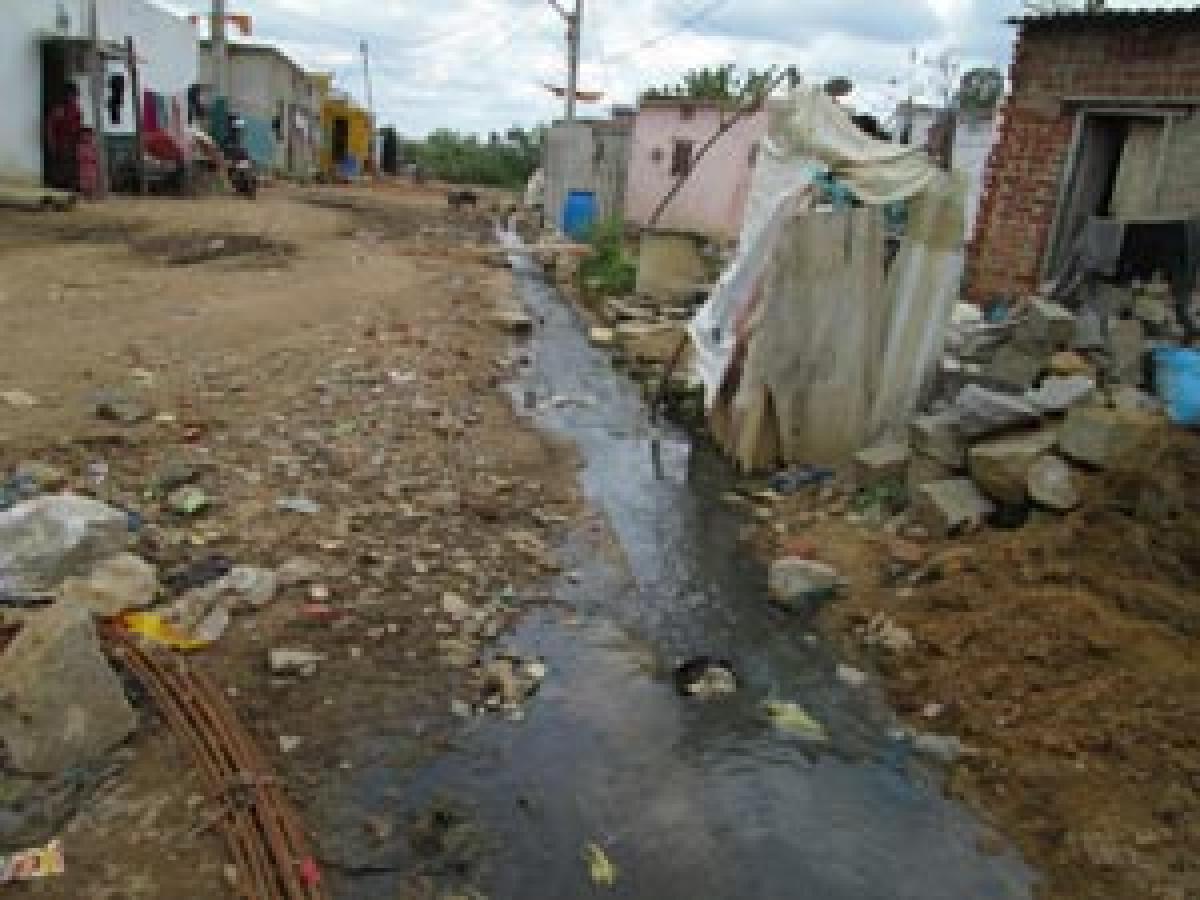Live
- Three dead in sofa manufacturing factory fire in Greater Noida
- Actor Sri Tej Accused of Cheating by Woman
- Constitution Day 2024: Celebrating India's Foundational Document
- 'When you lose, EVMs are tampered with; when you win, EVMs are fine', SC dismisses PIL
- India signs Final Act of Riyadh Design Law Treaty
- Oppn leaders protest outside Bihar Assembly over reservation, smart meter issues
- Best performances of Nandita Das that prove she’s an acting powerhouse
- Top 5 Plumbing Tips for Better Water Conservation
- Four students hurt in clash over ragging in Bhagalpur Engineering College
- Search operation continues to locate railway officer swept away in Arunachal river
Just In

Sangareddy municipality received an award for the best municipality in Medak district on Telangana formation day this year, for various developmental activities undertaken during the past one year.
People live in subhuman conditions
Sangareddy: Sangareddy municipality received an award for the best municipality in Medak district on Telangana formation day this year, for various developmental activities undertaken during the past one year. But for the slum dwellers in one the largest slums of the Grade A municipality, basic facilities are lacking, even three decades after the slum was formed.
It has been more than three decades since many below poverty line families from weaker sections were given little bits of land, so that they could build their own houses and lead dignified lives. Marx Nagar Colony, one of the biggest slums in Sangareddy was formed, named after Karl Marx, an 18th century philosopher. More than a decade ago some more landless families encroached on government land in the same area and even they were given pattas.
Though successive governments have been generous enough to give the people a new lease of life, through the years the colony has been reduced to a semi-urban ghetto with people living in subhuman conditions, turning the colony into a notified slum. A drainage system which was built in the initial years still exists, clogged with wastes coming from the high-lying areas.
The dimensions of the old drains are not enough to handle the amount of waste which has increased in the past few years. This has resulted in water flowing at ground-level and when it rains, the dirty water spills over onto the muddy roads, putting the slum dwellers in high risk of falling prey to diseases. New drains were constructed to cover some parts of the colony, but still considerable numbers of households exist where people, especially children, are directly exposed to the contaminated water.
The dirty water which carries clinical wastes from nearby hospitals and sewage wastes from houses flows through the slum before joining Errakunta, a water body in the slum. Locals say that the sewage water is sometimes used to irrigate paddy fields located on the other side of the bund.
Hundreds of pigs strolling in the drainage water, drinking and eating from it; is a common sight.
There are many houses where there is no bore water facility, forcing women and children to fetch water from a nearby colony. There is a working borewell right in front of the CPI office in the slum. Even a pipeline was laid underground, but work was left incomplete for reasons unknown. “Please give us tap connection,” pleaded Pochamma, an eight-year-old girl, who thought The Hans reporter was a government official.
Interestingly, no overhead water tank was built in the slum all these years. Over the decades, some people built multi-storeyed buildings in the slum. But not a single cement road has been laid till date. Garbage lying everywhere raises serious questions about the credentials of the municipality in implementing Swachh Bharat.
Though there is an Anganwadi school, out of the total 220 children aged between 0-6 years, hardly 10-20 children attend the school on any given day. A majority of slum dwellers (especially children from Pochammalollu community of ragpickers and beggars), do not go to school. There is also a problem with electricity. In one particular lane, people from many households have been living with only two-phase electricity.
A senior official from the municipality told The Hans India that there was no dearth of funds being given to ward number 21, under which the slum falls. People say that after elections, not even once did their representative visit the slum, let alone carrying out developmental works. Ironically though, Govardhan Naik, Vice-Chairman of Sangareddy Municipality is the people’s representative of ward number 21. He recently switched loyalties from Congress to TRS, along with Municipal Chairman B Vijaya Laxmi.
Though Muslims, Dalits, Banjaras and people from other weaker sections live together in harmony in Marx colony, a considerable majority of people who live there are Pochammalollu, ragpickers-cum-beggars. District administration has unsuccessfully tried in the past to rescue children from the community from being forced by their parents to beg.
Elderly people in the slum opine that the community could be rehabilitated only if they could perceive some sincerity in district and municipal administrations’ efforts to solve their civic issues.
By Vivek Bhoomi

© 2024 Hyderabad Media House Limited/The Hans India. All rights reserved. Powered by hocalwire.com







